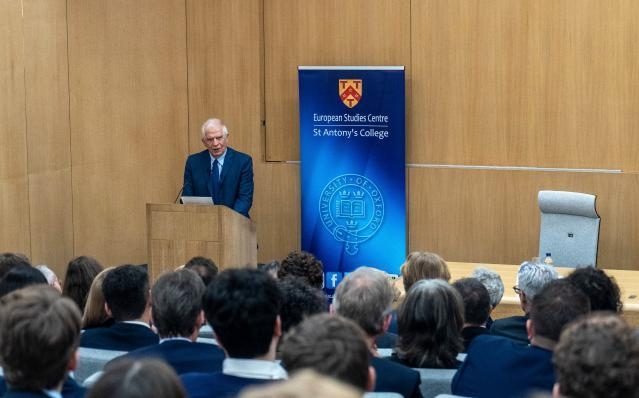51
Borrell speaks about global changes and challenges
www.commonspace.euEU High Representative for Foreign and Security Policy, Josep Borrell, delivered an important policy speech on Friday 3 May during which he did a wide tour d'horizon of the current global situation and the challenges it flags up for Europe and for the world. Speaking in an academic setting, delivering the Dahrendorf Lecture at St Antony's College Oxford, Borrell spoke of a world where there is much more confrontation than co-operation, where there is more polarity and less multilateralism, Borrell spoke about the diminishing role of the United States as world hegemon and the rise of China. We, Europeans, wanted to create in our neighbourhood a ring of friends. Instead of that, what we have today is a ring of fire. A ring of fire coming from the Sahel to the Middle East, the Caucasus and now in the battlefields of Ukraine, the High Representative said: Speaking on Russia, Borrell said Under Putin’s leadership, Russia has returned to the imperialist understanding of the world. Imperial Russia from the Tzar times and the Soviet empire times have been rehabilitated by Putin dreaming of a former size and influence. "It was Georgia in 2008. It was Crimea in 2014. We did not see, or we did not want to see, the evolution of Russia under Putin’s watch. Even though Putin himself had warned us at the Munich Security Conference in 2007. It is important to re-read what Putin said in 2007 at the Munich [Security] Conference that I am afraid that nobody wanted to hear or to understand." Borell described Putin as "an existential threat". In his speech Borell dwelt on the wars in Ukraine and in Gaza. "Now, we have two wars. And we, Europeans, are not prepared for the harshness of the world." The High Representative said that the way of living of the Europeans, "this best combination of political freedom, economic prosperity and social cohesion that the humanity has never been able to invent, is certainly in danger. And in order to face these challenges, I think that we have to work on three dimensions: Principles, Cooperation and Strength."



Why do they think Ukraine should lose?
Because there is no path for Ukraine to win.
I don’t get it, as when the war started it was one of those “over by Christmas” things.
Not really. Russia never made any statements to that regard. Only the western press claimed that this was Russias intent.
It seems that plan A was a rapid advance towards Kiev to force negotiations. Which worked until the west made clear that Kiev was not the one to make peace.
So Plan B went on: Increase forces and grind Ukrainian forced down from defensive positions.
No, I meant I thought Russia would lose by Christmas. Might be remembering it wrong though.